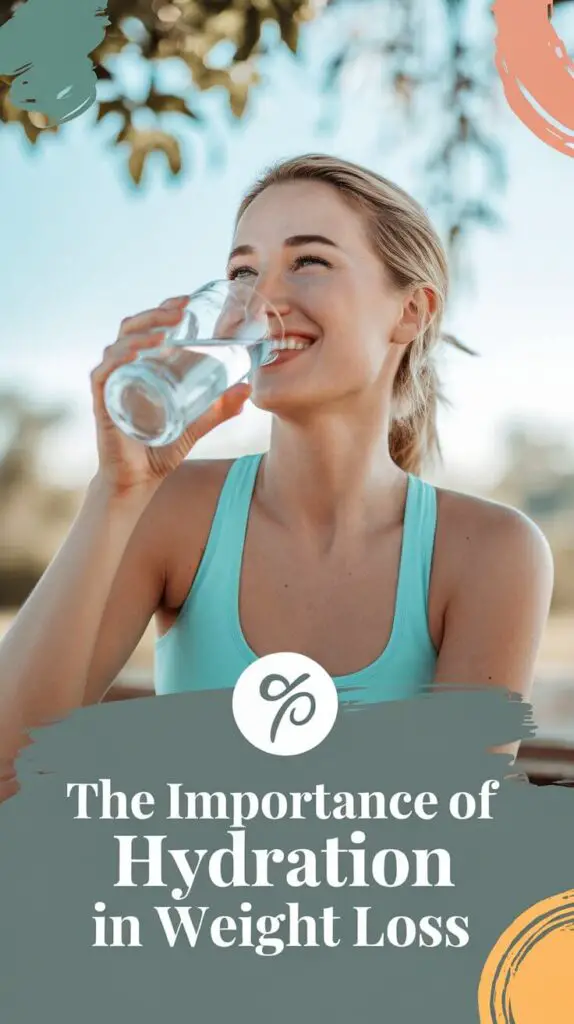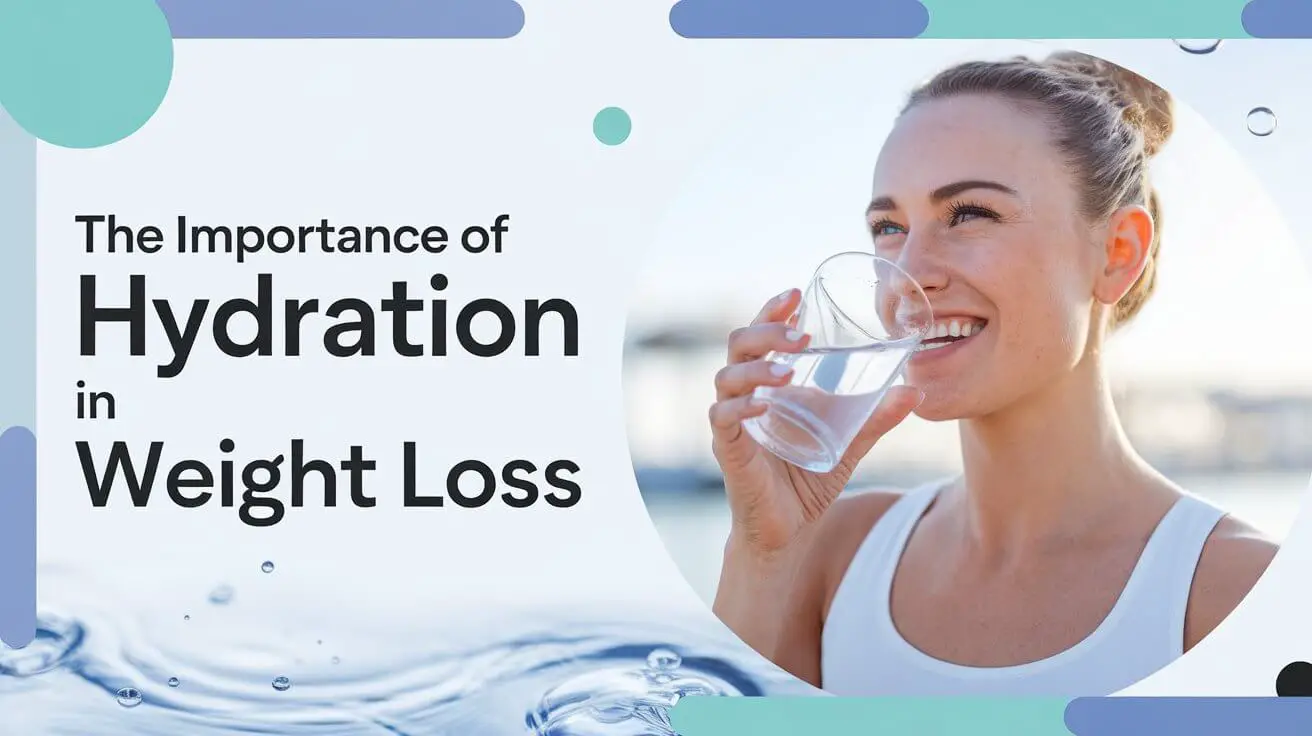If you are embarking on a weight loss journey, you might already know that diet and exercise are the usual focus points. However, there’s one crucial element that’s often overlooked: hydration. Proper hydration is essential for overall health, and it plays a significant role in weight loss as well. In my own weight loss journey, I learned just how important staying hydrated is, and how it can make a difference when it comes to achieving lasting results. In this article, I’ll share my personal experience and explain why hydration should be an integral part of your weight loss plan.

How Hydration Affects Weight Loss
You might be wondering, “Why does hydration matter for weight loss?” It turns out that water is involved in many bodily functions that support fat loss and overall health. From metabolism to appetite control, staying hydrated helps your body run smoothly, which in turn helps you shed excess weight.
One of the first things I noticed when I started paying more attention to my water intake was that I had more energy during my workouts. When you’re properly hydrated, your muscles work more efficiently, allowing you to exercise for longer periods without feeling fatigued. This is especially important when you’re working towards a fitness goal alongside weight loss.
1. Water Boosts Your Metabolism
Drinking enough water can give your metabolism a boost. Studies have shown that drinking about 16 ounces (500 ml) of water can increase your metabolic rate by up to 30% for about 30-40 minutes. When your metabolism is running at full speed, your body burns more calories throughout the day, even while resting. I noticed that when I started drinking more water, my body felt like it was working a little harder at burning those extra calories.
So, if you’re aiming for faster weight loss, staying hydrated can play a big role in giving your metabolism that extra push.
2. Helps Curb Hunger and Cravings
One of the biggest challenges I faced during my weight loss journey was controlling my hunger and cravings. Sometimes, my body would send signals that I interpreted as hunger, but it turned out I was just thirsty. Water can help curb unnecessary snacking by keeping you feeling fuller for longer. When you drink water before meals, it can help you feel satisfied with smaller portions, preventing overeating.
I also found that keeping a bottle of water on hand throughout the day made it easier to resist the urge to snack between meals. Whenever I felt tempted to grab a sugary snack, I would take a sip of water first to see if it helped with my cravings. Most of the time, it did.
3. Water Aids in Digestion and Detoxification
Drinking enough water supports your digestive system by ensuring that everything runs smoothly. Proper hydration helps break down food so your body can absorb nutrients more effectively. It also aids in the elimination of waste and toxins, keeping your digestive system in good working order.
In my experience, staying hydrated helped with bloating and digestion, especially after meals. I noticed that when I was dehydrated, I would often feel sluggish and experience bloating, which could make me feel uncomfortable and discourage me from continuing with my healthy habits.
4. Prevents Water Retention
It might sound counterintuitive, but drinking more water can actually help reduce water retention. When your body is dehydrated, it tends to hold onto water as a survival mechanism. But when you drink plenty of water, your body recognizes that it doesn’t need to store extra fluid, and as a result, it flushes out the excess water. This can help you look and feel less bloated.
I remember during the early stages of my weight loss journey, I would often feel like I hadn’t lost any weight because of water retention. But once I made hydration a priority, I noticed that my body stopped retaining as much water, and my weight loss started to become more noticeable.
5. Improves Exercise Performance
Exercise is a critical part of any weight loss plan, and staying hydrated is key to performing at your best. Dehydration can lead to fatigue, dizziness, and muscle cramps, all of which can hinder your workout progress. Drinking water before, during, and after exercise helps maintain electrolyte balance, supports muscle function, and keeps your energy levels up.
In my personal experience, I found that when I didn’t drink enough water before a workout, I struggled to complete it and didn’t get the best results. But when I made sure to stay hydrated, I could push through longer workouts and felt more capable of challenging myself.
How Much Water Should You Drink?
Now that you know why hydration is important, you may be wondering how much water you actually need. While the amount of water needed can vary from person to person depending on factors like activity level, climate, and health, a general guideline is to aim for at least eight 8-ounce glasses of water a day, which is about 2 liters or half a gallon. This is known as the “8×8” rule and is easy to remember.
However, if you exercise regularly, you’ll need more water to compensate for the fluid lost through sweat. I personally found that when I increased my water intake to about 10-12 cups per day, I felt better and more energized.
It’s also important to listen to your body. If you’re feeling thirsty, that’s a sign that your body needs more water. Keep an eye on the color of your urine as well. If it’s pale yellow, that means you’re well-hydrated. If it’s dark, it’s time to drink more water.
Simple Ways to Stay Hydrated
Staying hydrated doesn’t have to be a challenge. Here are a few simple tips that worked for me during my weight loss journey:
-
Start your day with water: Drinking a glass of water as soon as you wake up helps kickstart your metabolism and rehydrates your body after a night’s sleep.
-
Carry a water bottle: Having water within reach throughout the day makes it easy to stay on track. I carried a reusable water bottle with me everywhere, and it helped remind me to drink more water.
-
Drink water before meals: This not only helps with hydration but also helps control hunger, preventing overeating during meals.
-
Infuse your water: If plain water feels boring, try adding slices of lemon, cucumber, or mint to your water for extra flavor and nutrients.
-
Eat water-rich foods: Foods like watermelon, cucumbers, and oranges are packed with water and can contribute to your hydration. Adding these to your meals or snacks can help keep you hydrated.
Conclusion
If you are serious about losing weight, don’t overlook the importance of hydration. Drinking enough water supports your metabolism, helps control your appetite, improves digestion, and enhances your workout performance. By making hydration a priority, I noticed a significant difference in my energy levels, cravings, and overall progress on my weight loss journey.
Remember, hydration isn’t just about drinking water; it’s about nourishing your body so it can function at its best. By incorporating these simple habits into your daily routine, you’ll not only feel better but also improve your chances of success on your weight loss journey. Stay hydrated, and give your body the support it needs to reach your goals.
